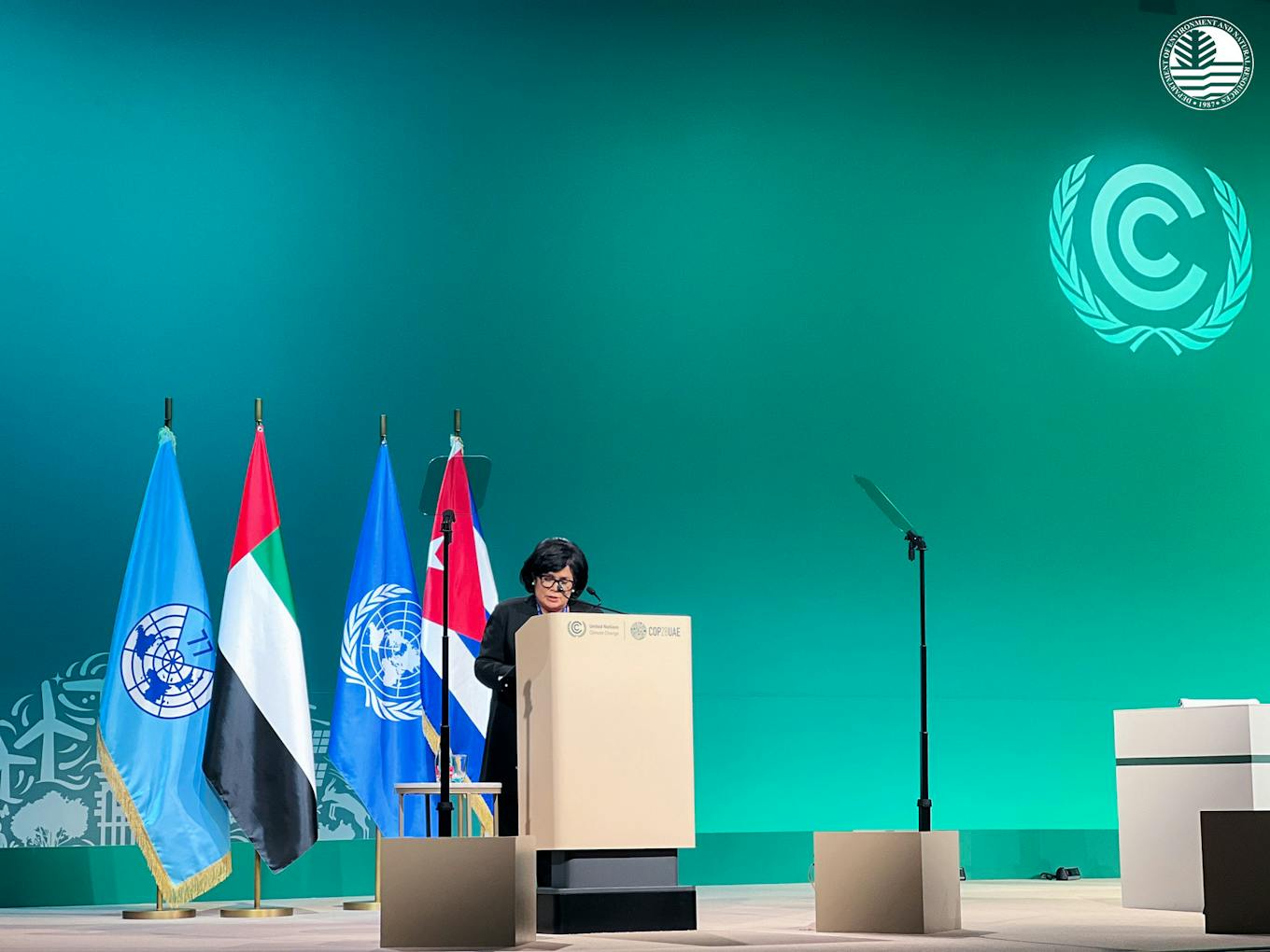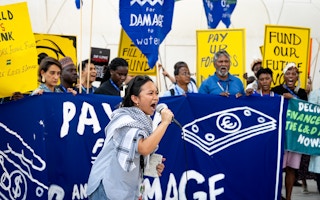The Philippine government wants the secretariat of the new United Nations loss and damage fund to consider it as a venue host and says that it is qualified to host the fund, given that it is among the countries most vulnerable to climate disasters.
To continue reading, subscribe to Eco‑Business.
There's something for everyone. We offer a range of subscription plans.
- Access our stories and receive our Insights Weekly newsletter with the free EB Member plan.
- Unlock unlimited access to our content and archive with EB Circle.
- Publish your content with EB Premium.
This is not the first time that leaders of the Philippines have expressed the nation’s intention to host the global fund that would help poor countries deal with the adverse impacts of climate change, but at the COP28 summit in Dubai, its environment secretary Ma Antonia Yulo-Loyzaga reiterated the call when delivering the Philippines’ country statement on behalf of president Ferdinand Marcos, Jr. on Monday. This is despite an earlier agreement reached at COP for the World Bank to be interim host for the fund.
The statement said the Philippines is willing to host the board of the loss and damage fund. “Doing so will serve as a poignant reminder of the pressing need to address the disproportionate impacts faced by developing nations. It would symbolise a commitment to inclusivity, ensuring that the voices and experiences of the most affected countries are heard and considered in shaping global climate policies.”
It also said the Philippines advocates an inclusive, transparent and accountable approach in addressing the climate crisis.

Environment secretary Ma Antonia Yulo-Loyzaga delivering the Philippines’ country statement on behalf of president Ferdinand Marcos, Jr. at the COP28 climate summit. Image: DENR
Ana Mulio Alvarez, a loss and damage researcher from London-based think tank E3G said that the Philippines mainly wants to be able to host and be near to future meetings and discussions for the loss and damage fund, while the World Bank provides a legal framework as a financial intermediary fund.
For example, the Green Climate Fund (GCF) is a UN Framework Convention on Climate Change (UNFCCC) mechanism that works to finance adaptation and mitigation initiatives in developing countries, and is hosted by the World Bank which is its interim trustee, said Mulio.
In the case of GCF, a board had invited for countries to submit host country proposals. Songdo, a city built on reclaimed land 30 metres southwest of South Korea’s capital city Seoul, won the bid and GCF is now headquartered there.
The secretariat of the UN adaptation fund board, on the other hand, is based in Washington, D.C. but operated by the World Bank as its financial intermediary fund.
When asked if the Philippines is qualified to host the fund, as Loyzaga said, Mulio said it is “too early to tell”.
“Many things should be considered when picking a secretariat location such as accessibility, regional representation and capacity, as well as cost-benefit analysis. We don’t even have a board yet,” Mulio told Eco-Business.
“
It cannot inspire confidence in its offer to host the loss and damage fund as long as it is hounded by issues on fund management back on our homeland.
Raoul Manuel, Filipino youth activist
The Philippines, according to Loyzaga, also wants to vie for a seat on the loss and damage fund board, which is in charge of governance and oversight of the mechanism.
The board members will be split evenly into developed and developing countries with a regional allocation, and specific seats are reserved for least developed countries and small island developing states.
The board selection is due by end of January next year but there is a push from the Alliance of Small Island States to finalise the process by the end of the climate summit, according to Mulio.
Housing a fund at the World Bank, whose presidents are appointed by the United States would give donor countries considerable influence over the fund and result in high fees for recipient countries, developing countries have said.
Mixed reactions at home
The Philippines as a host country to the loss and damage board and secretariat would “greatly help” the natural disaster-prone country in its quest for climate justice, said Lidy Nacpil, coordinator of the Asian Peoples Movement on Debt and Development (APMDD), a regional alliance of 50 member organisations and movements.
“If the government is able to carry out this job and there is no barrier on movement to participate meaningfully, it would be a good thing because Philippine civil society organisations are engaging on this issue,” Nacpil told Eco-Business.
Nacpil, who is a board member of GCF, said that a host country can call on member countries who have pledged to contribute to the fund to deliver on their obligations. The host country needs to cover the expenses for the events it holds, she explained.
Youth partylist representative Raoul Manuel, who represented the Philippines in an enquiry into the progress of a fossil fuels phase-out on the sidelines of COP28, said that the remarks by the Philippine government about loss and damage are not enough without bold action.
“It cannot inspire confidence in its offer to host the loss and damage fund as long as it is hounded by issues on fund management back on our homeland,” said Manuel.
The Marcos Jr. administration drew flak early this year for creating the Maharlika Investment Fund, a sovereign fund which intends to divert a portion of already insufficient public funds into a centralised pool managed mostly by presidential appointees.
There is also the issue of billions of funds in the proposed national budget being kept confidential, which have been criticised as there is a lack of transparency as to how government agencies spend their share.
Manuel said: “These issues don’t make the current administration attractive enough to be the host of the loss and damage fund.”
Want more Philippines ESG and sustainability news and views? Subscribe to our Eco-Business Philippines newsletter here.












